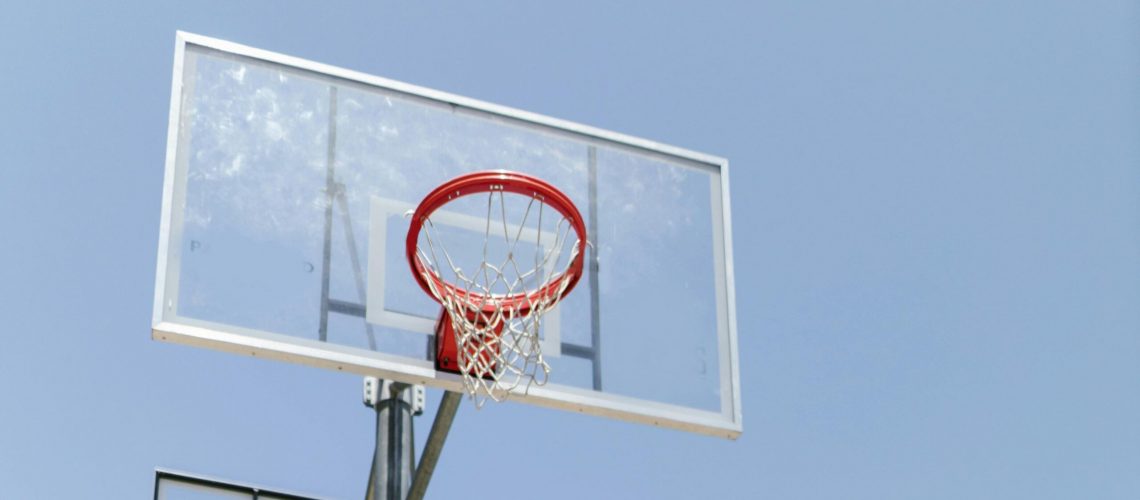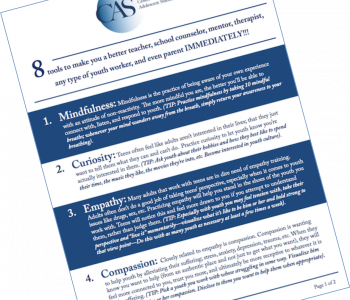

Sam Himelstein, PhD
Sam Himelstein, PhD is the founder of both the Center for Adolescent Studies and Family Spring
Mental Skills for Youth Athletes: Are You a Small Pup or a Big Dawg?
“Travel!” the floor coach yelled.
“What?” said my 12-year old son, Solomon, as he raised his hands in the air, palms facing upward.
A short exchange followed where the coach approached Solomon and tried to calm him down.
It escalated.
“Whatever!” Solomon yelled as he flung his arms in the air. It was clear he was trying to get the travel call overturned, and the coach wasn’t having it. He didn’t notice that the coach was lightly touching his shoulder with his right hand; when Solomon flung his arms up, he aggressively, though unintentionally, swatted the coach’s hand and arm off of him, leaving the coach with a look of shock.
Watching from the sidelines, I nearly lost it myself. I was angry at his disrespect, even if it was unintentional, and embarrassed that he’d behave in such a way. It took a lot of mindfulness and self-regulation on my part to not yell out at that moment.
Solomon had been out of town on a summer trip with his brother and grandmother. This was his first practice after not touching a basketball for 8 days. He was rusty. He was having a bad game emotionally; being critical of himself, getting frustrated, and generally not having a good time.
He loves basketball.
Him not having a good time is definitely a big deal.
When practice ended, I waited for him to come over to me like he usually does to get some water and pack up to leave.
“What the hell do you think you’re doing?” I asked.
Even after self-regulating, and in a somewhat measured tone, I still wanted to express my anger.
I laid into him for a few seconds about how what he did was extremely disrespectful, especially to a coach who invests the amount of time and energy that his coach invests in him.
He was taken aback.He was remorseful and apologetic. He apologized to the coach before we went home, then we had a long talk about what happened. We worked together on writing an apology letter to the coach (which the coach was extremely thankful for).
I knew I needed to cool off before having a conversation with him so we didn’t talk much about the incident in the car ride home. A lot of my identities were being challenged. I’ve worked on my own emotional regulation for years, I am a clinical psychologist who helps people deal with difficult situations, and have a working understanding of the development of the child and adolescent brain. It was still really tough for me, and that was likely because of how close we are and how much I see myself in him.
Later that night I approached Solomon to talk about the “mental game.” We talked about the concept of a “palms up” player; a player who holds their palms upward, usually when complaining or disagreeing with something that’s happening in the game. We talked about how in that state of mind, the default is a negative feeling (e.g., frustration, anger, complaint, etc.), and that having a focused, disciplined, and strong game relies on being able to quickly get out of that mindset.
“Do you think you were being a palms up player?” I asked him.
“Yes,” he said.
It dawned on me at that moment, palms up player could easily be an acronym: PUP (for those who’ve read my blogs, you know how much I like acronyms; see this post on mindfulness-based acronyms).
So I said at that moment, “a palms up player is a PUP. Like a small, young dog, that’s not trained. A little PUP.”
After saying this out loud I realized that we’d never discussed what to do when in the PUP mentality. We’d talked about the concept before, but never discussed an alternative.
“The goal is to be a dog!” I said dog with a slight draw, as it’s colloquially said in basketball realms to describe a hard working, tough, skilled player.
“So what does dog stand for? What’s the acronym?” He asked.
Don’t be a little PUP, be a big DAWG
For the rest of the evening, we talked off and on and developed the DAWG acronym, an acronym that would encapsulate the mental and emotional state he could strive for during training and a game. Something I could remind him of from the sidelines; something he could think about to cultivate the state of mind he knows he’s worthy of.
We came up with the acronym DAWG; applicable to any sport or type of physical training:
D: Discipline. DAWGs are disciplined; committed, dependable, and think of themselves as having a strong sense of internal control.
A: Awareness/Attention. For a DAWG, their mind is their most precious real estate. This is where bad experiences turn good, and positive momentum can take over (with work of course). “Where attention goes, energy flows,” is a famous quote by author James Redfield. I came back to Solomon a few days later and shared this with him. “Your mind is your most precious tool. Where attention goes, energy flows. If you choose to keep directing your attention to the fact that someone called a travel on you, to the fact that you got fouled and there was no call, or to some other negative experience, it gets harder to transform that into positive energy and get back on your game.”
W: Work/Work hard. This is self-explanatory. A DAWG works hard. Physically, mentally, emotionally. If you work hard, and listen to the guidance of your trainers and coaches, you will get better. We can’t control how fast, but improvement will come.
G: Grow/Growth. As said above, if you work hard, you’ll see results. That’s growth. A DAWG has a growth mindset. They may not take quantum leaps overnight, but simply having the mindset of “I am getting better, I am improving, I’m working everyday” leads to growth.
A small PUP is a: palms up player. A big DAWG is someone who is disciplined, who’s aware and attentive, who works hard, and who grows. Youth athletes, through their coaches’ support, can improve their mindset to increase focus, discipline, and ultimately growth. That leads to greater satisfaction and enjoyment of the sport, which leads ultimately to greater well-being.
Since the co-creation of this acronym, Solomon has been attacking both his training sessions and games with the DAWG mindset. He’s still human and of course falls back into the PUP mind every once in a while. That’s normal. Change often doesn’t happen overnight. But now we have shared language around how to get back into focus and ultimately turn tough training sessions and games into positive experiences.
Related Posts:
TAP Into Your Experience: A Mindful Parenting Practice | Center for Adolescent Studies
How to Validate Teens (Even When You Don’t Agree) | Center for Adolescent Studies
10 Acronyms That Promote Self-Awareness and Decision-Making in Youth
Cultivating the Lion Mind: A Mindfulness Metaphor That Sticks

